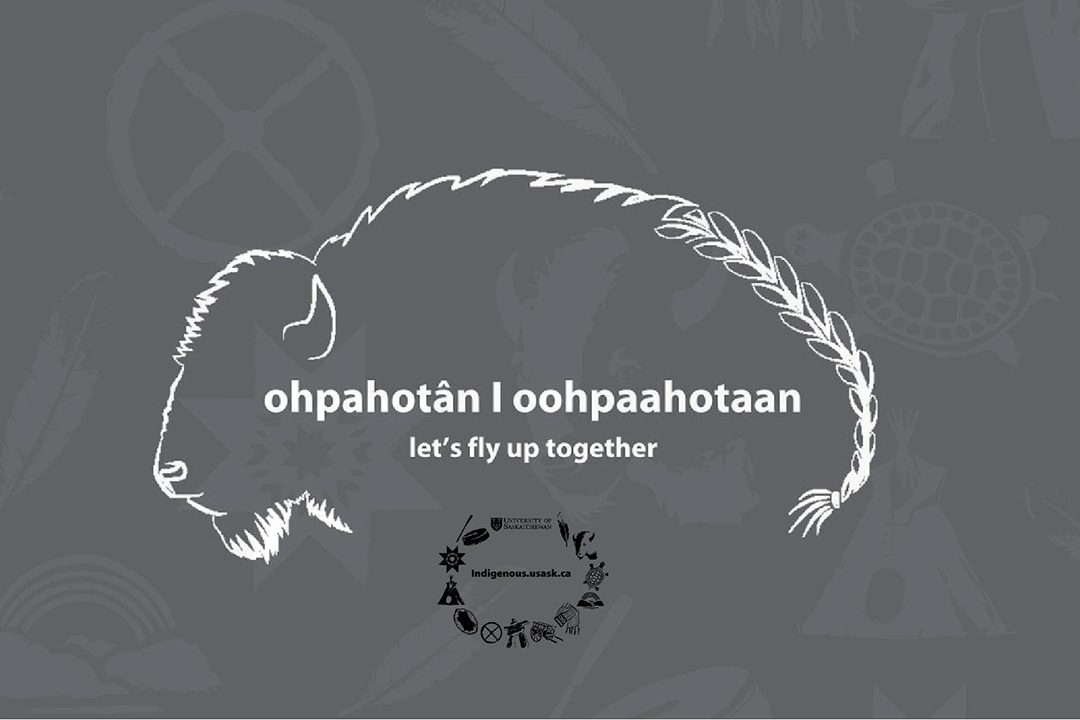
‘Walking together on this journey’
The April 21 ohpahotân | oohpaahotaan Spring Symposium will focus on USask’s Indigenous Strategy and its implementation
By Shannon BoklaschukAll members of the University of Saskatchewan (USask) community are invited to attend an event focused on ohpahotân | oohpaahotaan “Let’s Fly Up Together”—the first Indigenous Strategy solely created by Indigenous people at a Canadian U15 research institution.
Hosted by the Office of the Vice-Provost Indigenous Engagement, the April 21 ohpahotân | oohpaahotaan Spring Symposium will offer an opportunity to further explore the seven commitments outlined in the Indigenous Strategy: Safety, Wellness, Stewardship, Representation, Right Relations, Creation, and Renewal.
The Indigenous Strategy is meant to be a living document that provides an Indigenous-led pathway to reconciliation. It complements the University Plan 2025, which was gifted the Indigenous names nīkānītān manācihitowinihk (Cree) and ni manachīhitoonaan (Michif), translating to “Let us lead with respect.”
Dr. Angela Jaime (PhD), USask’s interim vice-provost Indigenous engagement, said Knowledge Keepers will share their perspectives on how ohpahotân | oohpaahotaan should be understood, the importance of Indigenous languages, and the importance of reciprocity. The event—to be held from 8:30 am to 1 pm in Marquis Hall—will encourage faculty, staff, and students to reflect on how they can work together to weave reconciliation and Indigenization into all aspects of university life.
Jaime said the symposium is about “reiterating to the campus the importance of walking together on this journey.”
“While some of us have an understanding that’s farther along, we’re all still working together to walk on this path,” she said.
The Indigenous Strategy was gifted to USask in a historic ceremony on Aug. 20, 2021. As a companion document to the University Plan 2025 nīkānītān manācihitowinihk | ni manachīhitoonaan (“Let us lead with respect”), it calls for meaningful and respectful action to advance Indigenization and to support transformative decolonization leading to reconciliation.
The Spring Symposium will explore important conversations that began during the ohpahotân | oohpaahotaan Fall Symposium, held on Oct. 28, 2022. That inaugural symposium enabled members of the USask community to connect and network.
Carson Magnuson, the project manager in the Office of the Vice-Provost Indigenous Engagement who played a key role in organizing the upcoming spring symposium, said the Indigenous Strategy requires continuous work by all members of the USask community to ensure it is woven into the daily activities and goals of all colleges, schools, and units.
“It needs to influence every piece of what you’re doing,” he said.
Magnuson said people’s lives today, and in the future, will be impacted by the ways in which the Indigenous Strategy is implemented at USask. He noted that the Office of the Vice-Provost Indigenous Engagement is a support for the campus community as this important work continues.
“We want to help, whatever that looks like,” he said. “We’re here as a resource.”
The name of USask’s Indigenous Strategy is ohpahotân | oohpaahotaan, which symbolizes growth, journey, and relational teachings that guide and strengthen our lives and work. As the strategy document notes, ohpahotân| oohpaahotaan was drawn from ohpahowipîsim (flying up moon): “During this moon, after a time of being nurtured in a nest and experiencing the world from the ground, a new generation of birds take flight.”
Dr. Airini (PhD), USask’s provost and vice-president academic, said respect and collaboration will be key as the USask community continues to implement the Indigenous Strategy.
“We continue to take action for transformative decolonization leading to reconciliation,” she said. “We are forward-looking as we consider how to strengthen and advance our commitments in the University Plan 2025 and calls to action in ohpahotân | oohpaahotaan. Our vision is to be an outstanding institution of research, learning, knowledge-keeping, reconciliation, and inclusion with and by Indigenous Peoples and communities. Together, we will be the university the world needs.”
All faculty, staff, and students are welcome to attend the ohpahotân | oohpaahotaan Spring Symposium and are asked to register online in advance.

